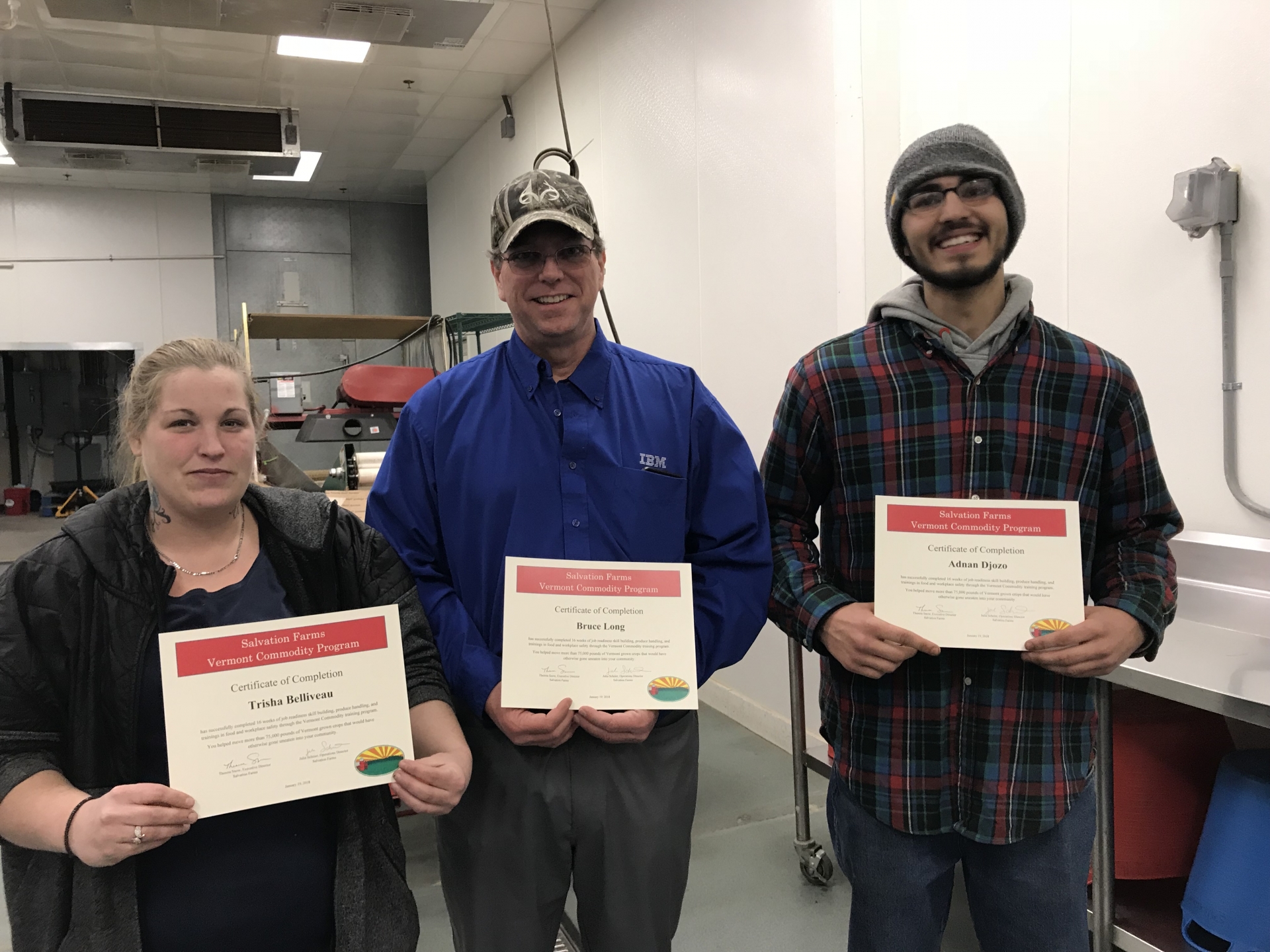2016 Co-op Patronage Seedling Grants
Salvation Farms: Food Hub Workforce Training Program - Initial Grant Award: $6,239 (actual check: $8,706.61)
Salvation Farms increases resilience in Vermont’s food system through agricultural surplus management. They are driven by three primary goals: 1) reducing food loss on farms; 2) increasing use of locally grown foods; and 3) fostering appreciation for Vermont’s agricultural heritage and future. Grant funding will support trainees in their community-based food hub workforce training program. The workforce development program includes post-harvest handling training, food and workplace safety considerations, and industry-recognized certifications, along with job-readiness skill building, guest presenters, and field trips.
2017 Update:
Salvation Farms is pleased to provide the following update and report of the use of Seedling Grant funds to support the Vermont Commodity Program.
Salvation Farms’ mission is to increase resilience in Vermont’s food system through agricultural surplus management. One way we accomplish this is through the Vermont Commodity Program, our surplus crop food hub where thousands of pounds of unsold crops from Vermont farms are brought each week to be cleaned, sorted, processed, and packed for distribution to food shelves and meal sites in the region.
Operations are made possible through a job-readiness initiative, where community members with barriers to employment learn on-the-job skills in food handling and light manufacturing, earn transferrable, industry-recognized certifications, gain food systems awareness, and hone their job-readiness skills. We believe that an experienced workforce that is proficient not only in skills such as inventory, shipping, and receiving, but also in self-confidence, teamwork, and problem-solving, will strengthen our local economy and community.
City Market’s Co-op Patronage Seedling Grant funding greatly helped support the workforce development training program during our third program cycle, which ran from October 2017 – January 2018. During this cycle, three trainees successfully completed the program, helping to move over 92,000 pounds of “un-marketable” crops – that otherwise would have been lost – to those most in need of nourishment in Vermont.
Throughout their program, trainees learned from guest speakers on topics such as food safety, Vermont’s Universal Recycling Law, manufacturing processes at Ben and Jerry’s, and conflict resolution in the workplace. They received financial literacy training, worked with instructors to craft their resumes and cover letters, and went on field trips to local employers, including City Market, to learn about the breadth of career opportunities in food and manufacturing.
Most notably, the trainees were interviewed by two highly-respected local companies. All trainees received job offers and two accepted positions within two weeks of completing our program, earning wages between $14-$18/hour.
The Seedling Grant funding specifically supported the training program as follows:
$1,500 to cover the cost of one trainee stipend (the others were eligible for WIOA funding/minimum wage through the Vermont Department of Labor)
$680 to cover the cost of rental vehicles for fieldtrips and to provide bus passes for trainees
$3,773 to cover the cost of 1st Aid/CPR, OSHA-10, and ServSafe instructor fees
$50 to cover a guest presenter honorarium
$167 to purchase work-appropriate clothing and boots for trainees
The remaining funds were used to cover personnel-related expenses associated with coordinating and overseeing all aspects of training, including those specific activities that the Seedling Grant funds paid for. Additionally, some grant funds helped cover a portion of fees associated with hosting an AmeriCorps VISTA member, who was vital in coordinating and executing the Vermont Commodity Program workforce development training efforts.
In addition to the feeling of accomplishment of moving fresh produce to the nutritionally-insecure in their community, the trainees overcame adversity with grit and determination and embraced the hands-on and experiential learning opportunity during their 4 months at the Vermont Commodity Program.
These individuals, who had various barriers to employment, have successfully pursued new career paths that otherwise may have felt out of reach. One trainee recently sent us this update: “Work has been good. Doing well. It’s very fast paced and labor intensive but I am picking it right up. Good thing I worked at Salvation Farms. It made my transition to the new job easier.”
Salvation Farms is continually seeking to improve our training program, create diverse partnerships, innovate our curriculum, and increase exposure to more local employers. In this vein, we are excited to partner with Vermont Works for Women to help deliver our training programs in 2018.
Salvation Farms deeply values this investment from City Market, which has allowed us to offer comprehensive training and support to our most recent workforce development trainees. Please do not hesitate to contact me if you have any questions about this report or our work at the Vermont Commodity Program.
